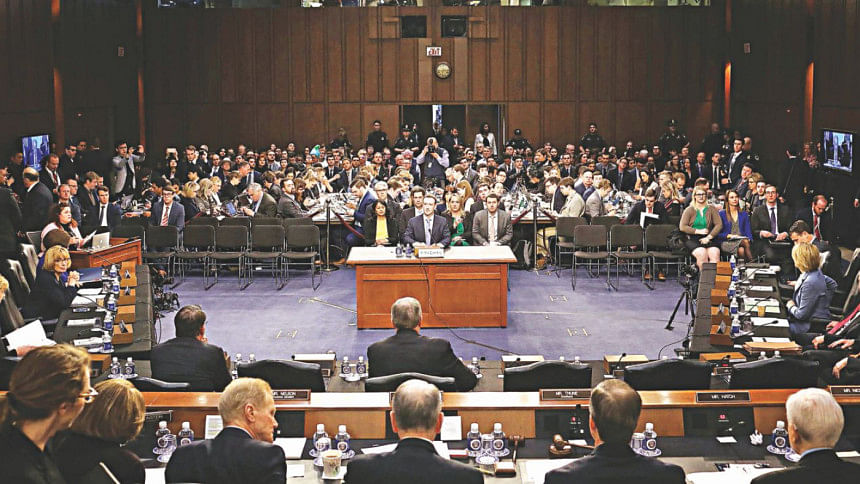Facebook in 'arms race' with Russia

Facebook chief Mark Zuckerberg accepted personal responsibility Tuesday for the leak of data on tens of millions of its users, while warning of an "arms race" against Russian disinformation during a high-stakes hearing with US lawmakers.
In his first formal congressional appearance, the Facebook founder and chief executive answered questions for nearly five hours as he sought to quell the storm over privacy and security lapses at the social media giant that have angered lawmakers and the network's two billion users.
Under mounting pressure over the hijacking of its user data by a British political consultant, Zuckerberg reiterated his apology for the historic breach, before being grilled over how Facebook collects and protects people's personal information.
"It was my mistake, and I'm sorry," Zuckerberg said about the improper sharing of 87 million people's information by Cambridge Analytica, a firm working for Donald Trump during the 2016 presidential campaign.
"I started Facebook, I run it and I'm responsible for what happens here."
He added that Facebook fell short in protecting the platform, noting: "That goes for fake news, foreign interference in elections and hate speech, as well as developers and data privacy."
The 33-year-old CEO spoke of a constant struggle to guard against Russian manipulation of the Facebook platform to influence elections in the US and elsewhere.
"There are people in Russia whose job it is to try to exploit our systems and other internet systems and other systems as well," he said.
"So this is an arms race. They're going to keep getting better and we need to invest in getting better at this too."
Zuckerberg has previously acknowledged the social network failed to do enough to prevent the spread of disinformation during the last US presidential race, reported AFP.
The Senate hearing, ahead of another appearance in the House yesterday, featured several tense and some friendly exchanges on Facebook's security, hate speech and other topics.
Of the hundreds of questions he faced, none appeared to flummox him more than Senator Dick Durbin's pointed query about where he slept the previous evening.
"Would you be comfortable sharing with us the name of the hotel you stayed in last night?" Durbin asked.
Zuckerberg paused for a full eight seconds, chuckled, grimaced and ultimately demurred.
"Um, uh, no," he said.
And "if you've messaged anybody this week, would you share with us the names of the people you've messaged?" the Illinois Democrat persisted.
Again, a similar unwillingness to answer.
Perhaps more than any other senator during five hours of questioning, Durbin's everyman tactic put a finger on the crux of the issue surrounding Facebook's handling of its users' private data.
OPEN TO REGULATION
The 33-year-old internet mogul managed to deflect any specific promises to support any congressional regulation of the world's largest social media network and other US internet companies.
Zuckerberg said he was open to regulation, but cautioned against complex rules that might impact emerging social media firms.
"I think the internet is becoming increasingly important in people's lives and I think we need to have a full conversation about what is the right regulation," he told the hearing.
"You need to be careful (a new regulatory policy) doesn't cement in the current companies that are winning."
Zuckerberg also revealed that Facebook is cooperating with the US special prosecutor investigating Russian interference in the 2016 vote.
HATE SPEECH IN MYANMAR
During the hearing, Zuckerberg said his company would step up efforts to block hate messages in Myanmar.
"What's happening in Myanmar is a terrible tragedy, and we need to do more," he said. More than 650,000 Rohingya Muslims have fled Myanmar's Rakhine state into Bangladesh since insurgent attacks sparked a security crackdown last August.
United Nations officials investigating a possible genocide in Myanmar said last month that Facebook had been a source of anti-Rohingya propaganda, reported Reuters.
Myanmar civil society groups yesterday welcomed Zuckerberg's commitment to increase efforts to curb messages inciting violence, but urged the social media giant to deploy more resources in the Southeast Asian country.
"This is a historic commitment from Facebook to a 24-hour review time, and one we have been begging for," said Yangon-based social media analyst Victoire Rio, of Zuckerberg's commitment to remove within a day posts that may spur violence.
"It is still unclear how they intend to demonstrate that they are meeting these targets...We will continue to monitor them," said Rio, who was involved in an email exchange between Zuckerberg and several Myanmar civil society groups on Facebook's effectiveness in detecting and curbing hate speech.

 For all latest news, follow The Daily Star's Google News channel.
For all latest news, follow The Daily Star's Google News channel. 



Comments